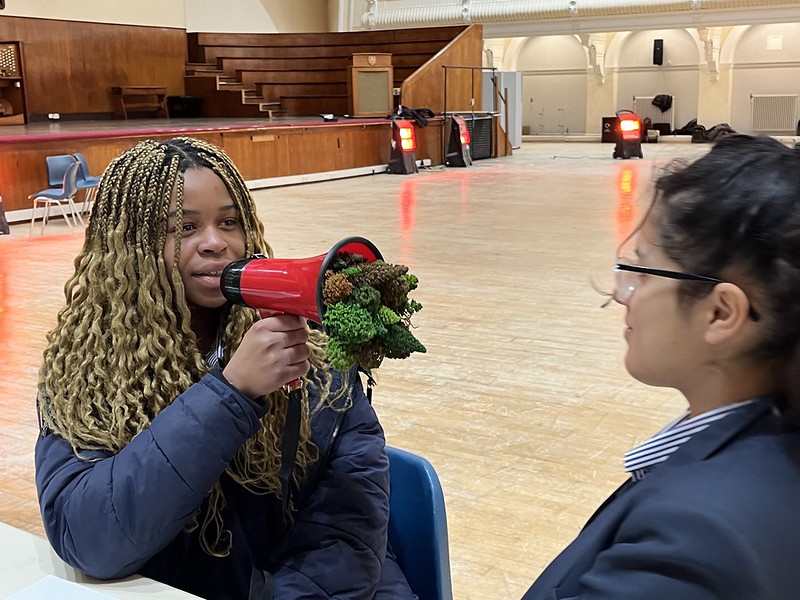
Future anxiety
In 2015-2017, Flow Associates carried out a creative consultation project with young people across the East and South East of the UK, from the Isle of Wight to Norfolk. (Flow was founded by Bridget McKenzie, who also founded Climate Museum UK.) This, supported by Festival Bridge, with ROH and Artswork Bridges, was called Future Views. We travelled into the future with young creatives and cultural workers, exploring barriers and potentials for their places to be thriving and creative in future. We began workshops by drawing out their perceptions of future barriers to the wellbeing of their communities. In every place, the most common overriding concerns of young people were climate change, supremacist politics, economic inequality and conflict over resources. Although the focus of our workshops was on how arts and culture could flourish, these concerns were acknowledged because these are fundamental factors in how well our societies can collaborate in freedom and with basic needs of everyone being met.
This was an indicator of ‘future anxiety’, or anticipatory anxiety, that many young people are increasingly experiencing. Since then, the Covid-19 pandemic has shown how global environmental neglect* can lead to severe disruptive events that have had a major impact on young people’s mental wellbeing and education.
Now, young people in the UK are amongst the most mentally distressed in the world. The ‘Mental State of the World’ report, March 2023, shows (in figure 1.5) that 35.7% of young people are distressed or struggling, pipped by only 0.01% by South Africa.
*Covid-19 is a zoonotic pandemic that results from ecocidal treatment of nature, exacerbated by lifestyles out of tune with nature.
Voice and empowerment
When helping young people express their voice, adults have to help them articulate complexities that might be in their lived experience but not on the tip of their tongues. Adults working with them can help them focus on the causes and solutions of the crisis. There is a lack of democracy and voice in the UK’s political system, affecting young people particularly. The lack of Proportional Representation, and the control of mainstream media by vested conservative industrial interests means that there is a lack of civic engagement around policies, focusing instead on ideological binaries of left and right, with strength valued more than collaboration in political leaders.
Social and mainstream media are ‘weaponised’ by vested industries to minimise environmental problems, deny scientific facts, promote false solutions, support ‘predatory delay’ and shame citizens about their lifestyle choices and hypocrisies. See the Climate Media Coalition for a campaign to reverse this.)
The lack of education about environmental and social justice issues is leaving many disempowered and disillusioned. The Earth crisis is immensely complex – with many causes, impacts, solutions, debates and conundrums. Coverage in schools and university education is inadequate to prepare young people to face the impacts of the Earth crisis. (See Teach the Future for a campaign to reverse this.)
The burden of debt from house prices and education fees, combined with stagnating wages and rising cost of living, is falling heavily on the shoulders of young people compared to older generations.
Research with young people reveals that there are gaps in their education and understanding about the Earth crisis, so that they don’t feel empowered to speak up to influential people, or with people who might challenge their views:
- Our Listening Project for A New Direction found that young people are frustrated at the assumption that they are knowledgeable eco-warriors, and feel pigeon-holed and burdened with this role. Young people can lack confidence to speak on these issues for fear of being called ‘too emotional’ or being criticised for lack of detailed knowledge.
- Climate Outreach and SPARK surveyed 6,000 young people in 2022, and found that there were gaps in understanding climate as a social and justice issue. They don’t understand the links between historic colonialism and current environmental issues. They need to learn much more about climate justice, to join the dots and explain them to others.
- A BBC Newsround survey in 2020 found that 40% of children and young people don’t trust adults to tackle environmental problems that affect their futures. 66% of them said that leaders don’t listen to them, so they don’t feel encouraged to learn and speak up about it.
- Conversations with four young activists, asked ‘How will you reboot the future?’ makes clear that speaking up is vital.
Being possitopian as an alternative to doom or gloom
Being possitopian is an approach to future thinking which greatly expands the cone of the possible future, drawing on geophysical realities and data. It applies maximum imagination to help us envisage future scenarios which are potentially worse or better than we might allow ourselves to think.
Read more about being possitopian, the founding principle of Climate Museum UK.
Possitopian thinking is non-binary, as it allows possible scenarios to be explored within an assumption that we ARE in a context of collapse, and also that the biosphere holds potential of regenerative recovery. Young people do not like being lied to about the Earth crisis. They want to be able to voice their truths, and contribute their vibrant imaginations to all our future thinking.
Here are some other resources about imagining futures:
- Rob Hopkins ‘From What Is to What If: Unleashing the Power of the Imagination to Create the Future We Want’
- About Thrutopia by Rupert Read
- Wales has a commissioner for Future Generations.
And on this website you will find more activities for young people to imagine futures.